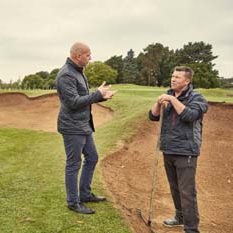Measuring agronomic advice against profits
Are you really achieving your goals when seeking consultancy or agronomic advice for your golf course? Paul Copsey argues that the advice received should be measured by quantifiable facts – notably increased profits for your golf club
There is an increasing number of independent consultants and larger professional bodies active within the golf course industry offering agronomic advice to clubs and courses. It is understandable given that clubs are often looking to ‘improve standards’, ‘get faster greens’ and ‘make sure the course is in good shape’.
All worthy aims on the face of it and there are some very good people out there from who you can obtain advice, but looking at the statements; are these really clear and quantifiable goals? Are these specific objectives?
I would like to offer an alternative way of looking at how we use ‘agronomic or golf course consultants’ currently. My view is coloured by 40 years in the golf course management business and 20 years as an internal ‘consultant’ managing multiple golf courses as well as my own. However, my overriding approach is governed by how other industries use consultants and one that I met in particular many years ago, assigned to a company I was working for under a government initiative. He was a business and financial expert. He made his work and how we should judge his value to our business very clear; he was to be totally self-funding – in fact he was very clear in that we should make more money than we previously did. Our measurable goals for his and our success were; increased sales, increased profits and reduced costs from better working practices. Perhaps the easy thing here is that in all these cases we are dealing with numbers – clear maths and measurable facts.

For some reason with regard golf courses, the waters seem far murkier with clubs seeing consultancy services as an additional cost. Many often do not realise the additional costs of adding the ‘advised’ products, machinery or practices to their budgets, and then not being able to objectively measure if their course is actually improving or delivering the results they expected, or their golfers wanted. I always stick to the adage that if you can not measure it, you can not manage it, something of a high priority I learned when managing 30 courses simultaneously in a commercial environment.
I believe the consultant needs to be very clear on his value to the golf course. In my case this was to understand the business model, pricing structure and customer expectation of each club. Using the golf course condition and turf quality as a tool I should then be driving rounds, increasing membership and generating repeat business – measurable financial gain within its market.
From the other end of the spectrum my job was reducing costs, ensuring that product purchasing was strictly controlled to deliver the course quality that was desired to meet the maintenance plan that would be delivering the financial success. This would also be ensuing that labour and machinery levels were correct and best practice was adhered to, but the most important part was a clear, meaningful, objective – monitoring of course conditions and standards that was easy to record, clearly scored with numbers, contained just the important data, was easily understandable by staff, management and members, and provided a mechanism for identifying any short term goals or changes to the work schedule, but also who was accountable and what dates work required completion.
Perhaps as a little test it would be very interesting and valuable to ‘audit’ the quality and success of the advice your club is getting. How much does the service cost? Does the advice you are getting show an increase in the use and costs of fertilisers, chemicals products, machinery and additional labour from before the service was undertaken? Has your roundage, membership numbers and income grown since before the service was undertaken? Are your golfers happier – have you done a survey?

Has the course actually improved in quality – and would you actually know?! The most misleading quotation in golf; ‘the course is in the best condition it has ever been in’. For me a ‘nice to hear’, but coming from one golfer on one day, it is a pretty meaningless statement. I would suggest that you need also to run your own internal auditing system to monitor course condition and playability. I have seen ‘reports’ from consultants that vary from one side of A4 to eight pages supposedly reporting and tracking course condition that can be meaningless to the player, club or greenkeeper. Others are now crammed so full of additional data and charts that everyone is left wondering what it all really means – I like my numbers, but ones that I can work with, understand, act upon and guide me to deliver results. I have also seen other clubs relying on the input of data and agronomic advice from salesman – a not entirely independent source? We are seeing a current change in the use of certain insecticides and fungicides on our courses – certainly not the end of the world for those with sound management and maintenance plans, but an opportunity for certain sales personnel to promote their wares – are these actually legal, had independent testing and are the people actually selling and offering the advice BASIS or FACTS qualified?
Like any external service you engage for your club or property, you need to review its value to you and consider changes if you see fit, but perhaps use a wider and more specific view in your decision of what is right for you.
Managing golf clubs and courses in the 21st century is a tough and competitive business. I could perhaps be accused of being a little mercenary in my attitude to the course being a means to an end or coming at the issue form the other way around – its condition and profitability being inexorably linked to golfer and member satisfaction and continued financial success. Every head of department at the club is accountable, so there is no reason that the club or course should not review or monitor the performance of its advisors or consultants.
Paul Copsey is the managing director of Turf Machinery Acquisitions LLP, a company founded in 2017 in response to the need in the golf industry for greater efficiency and a more formalised structure for the purchasing of machinery. The company works as a consultant partner to ensure that golf courses and clubs purchase the equipment they need at the best price.
He is also a member of Golf Business International and was previously regional and group courses manager for both American Golf and Crown Golf, where he directed the agronomic planning and golf course management practices across all of their golf courses. With 40 years’ experience in golf course maintenance, turf agronomy, general management and golf business planning, he has significant experience and expertise in the specifying, negotiating and purchasing of turf equipment.
Tel: 07774 823119















Let me tell You a sad story ! There are no comments yet, but You can be first one to comment this article.
Write a comment